
Isis defeated in Syria but more dangerous in Europe:
273 muslim arrested in France in 2018, 40 in Italy.
Mistery about the detained in United Kingdom
Al Qaeda and migrant terrorists the big threats
___di Fabio Giuseppe Carlo Carisio per VT Italia
«In 2018, terrorism continued to constitute a major threat to security in EU Member States. Horrific attacks perpetrated by jihadists like those in Trèbes, Paris, Liège and Strasbourg killed a total of thirteen people and injured many more. In addition, one terrorist attack by a right-wing extremist in Italy and numerous arrests of suspected right-wing terrorists for attack-planning across the European Union (EU) indicate that extremists of diverging orientation increasingly consider violence as a justified means of confrontation. Terrorists not only aim to kill and maim but also to divide our societies and spread hatred. We need to remain vigilant if we are to protect our citizens and values in the face of attempts to use violence for political aims».

These words are writed by Catherine De Bolle, former general commissioner of the Belgian police and since 2018 executive director of Europol, in the dossier The Sat 2019, the annual Terrorism Situation and Trend Report elaborated by the all law enforcement agencies of the European Union. It has just been published by Europol and therefore has not yet been released by the international media. The most striking figure in the statistics is that of arrests: 1,056 suspected terrorists who ended up in handcuffs in 2018, 511 of whom were supporters of Jihad in the name of Allah.
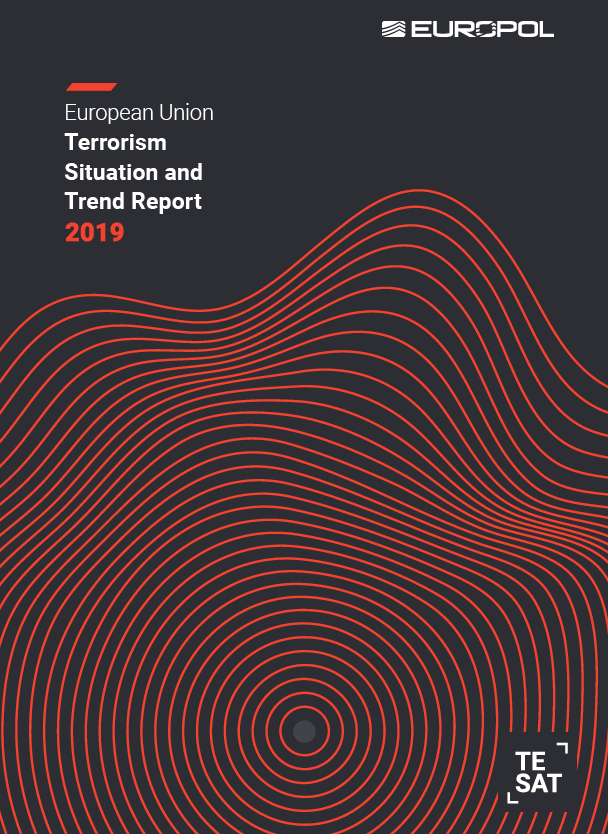
THE NATIONALIST AND LEFT-WING TERRORISM
In it emerge three substantial serious emergencies: ethnic-nationalist terrorism above all in Great Britain (Northern Ireland), which holds the record of 83 attacks (completed, failed or foiled by the policemen of various countries), that of jihadist inspiration particularly serious in France, where half of the 24 attacks (8 carried out and 16 attempted) by Islamic radicals were recorded, and finally that of left-wing extremists: 19 cases throughout Europe compared with only 1 of right-wing inspiration.
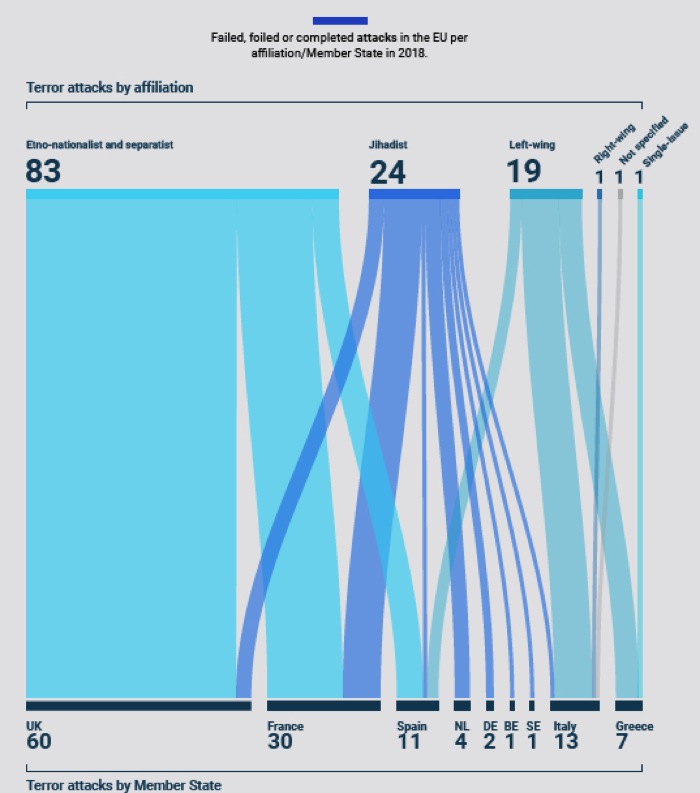
Since, however, the political orientation of the European Union has always been socialist-democratic, the director of Europol focuses on the danger of ultra right-wing terrorists by completely omitting to deign to mention the one made by the left-wing with 19 attacks carried out in 2018 (10 in Italy only): in this year in the European Union the left extremists arrested were 34 and 44 on the right, confirming that the preventive action is much more concentrated towards the neo-Nazi groups rather than the heirs of the infamous communist italians Red Brigades, despite the very different number of attacks.
THE JIHADIST THREAT IN EUROPE HIDEN BY THE UNITED KINGDOM
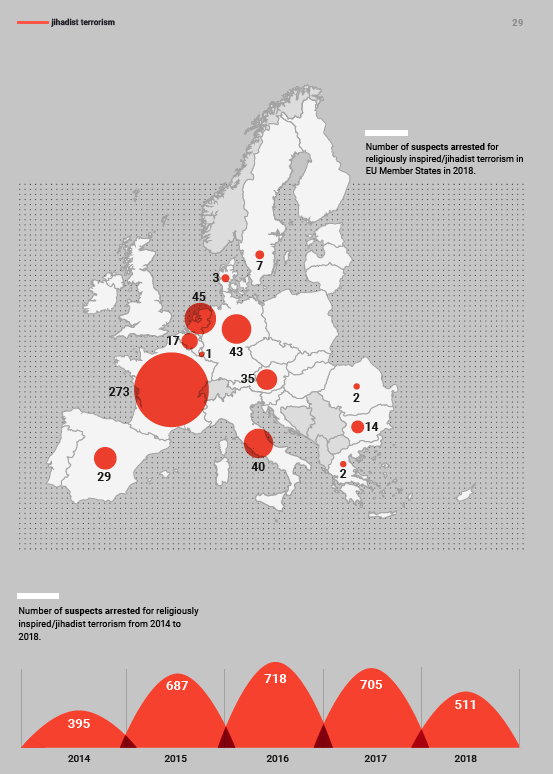
But the most serious alarm for Europe is represented by jihadists. If in the past year in the multi-ethnic France, emblem of freedom, equality and brotherhood, 273 suspects of Islamic terrorism were arrested, in the Netherlands 45 and in Germany 43, in Italy 40 Muslims were imprisoned for conspiracies aimed at successful attacks especially in French territory (10) and the Dutch and British ones (4) compared to only two in the German state and one in the Italian state.
An accurate analysis of the document also reveals the crude attempt to cover up the jihadist alarm in Great Britain: while in all other nations the number of radical Islamic terrorists is clearly evident, in the reign of Queen Elizabeth II, where the Sharia Courts are active and recognized since many years for the resolution of civil disputes in family problems, the intelligence and police services have preferred not to release the real data of those arrested on a Muslim basis.
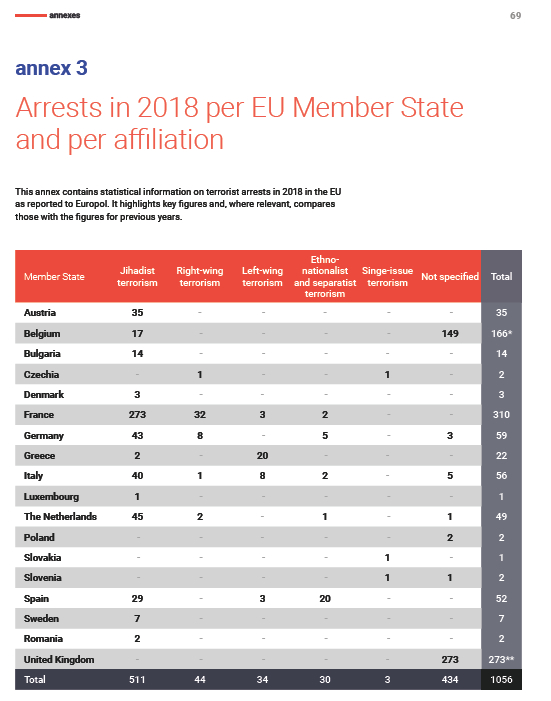
In the fight against terrorism “the United Kingdom has contributed with 273 arrests not disaggregated by type of terrorism and does not include 148 arrests carried out in Northern Ireland”, writes a note of the dossier The Sat which shows that London, administered by a Muslim mayor. didn’t want to specify the number of Jihad fanatics detained, despite the alarm from the NCA (National Crime Agency, the US homologated to the American FBI) for serial rapes against underage girls made by Muslim gangs in various counties, as reported by Gospa News months ago.
So the Europol report is already partly “distorted”, although the director De Bolle herself is the first to highlight the serious danger of the jihadist threat in the European Union which is increasingly benevolent due to the indiscriminate reception of African migrants despite their very such continent is the ferment and proliferation of radical Islam.
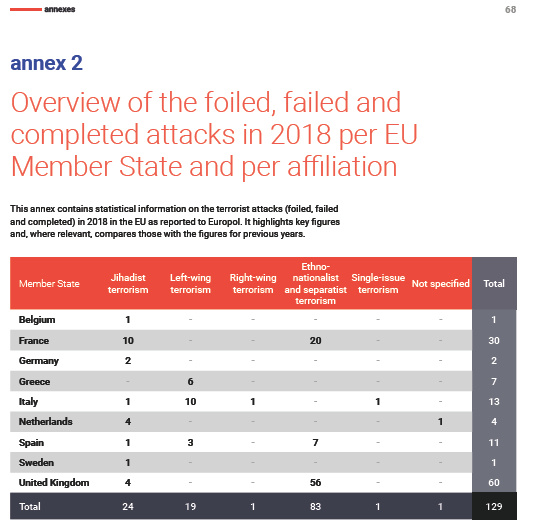
“Whereas in 2017 jihadists perpetrated ten terrorist attacks in the EU, we suffered seven jihadist terrorist attacks last year. At the same time, however, the number of disrupted jihadist terrorist plots increased substantially. The latter included attempts to produce and deploy chemical and biological substances, a fact which illustrates the level of intent and commitment of individuals, cells and networks to use terrorist tactics to harm the societies they live in – writes the Europol director, launching a new serious alarm – The level of the threat from terrorism, thus, has not diminished, despite the military defeat of IS earlier this year. If anything, the situation has become more complex. Within the jihadist milieu, multiple actors of diverging motivation and allegiance are plotting alone or conspiring with others; and right-wing extremists, in a bid to justify violence, prey on the perception of a threat from Islam, which some people readily fuel by interpreting terrorist propaganda and criminal behaviour as representative of a world religion.”.
THE JIHADIST ATTACKS IN 2018
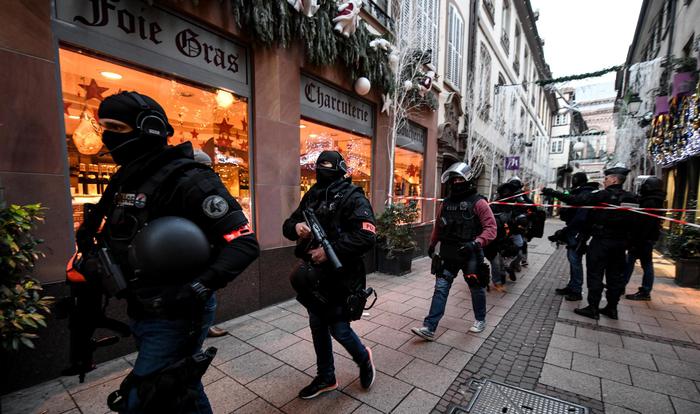
The following is an overview of the completed jihadist terrorist attacks in 2018, four of which were claimed by the so-called Islamic State (IS).
On 23 March, a 26-year-old Moroccan male hijacked a car in Carcassonne (France), killing the passenger and wounding the driver. Later, he shot and wounded four police officers nearby military barracks, and attacked a supermarket in Trèbes, where he killed two civilians, injured several others and held the customers hostage. A lieutenant colonel of the French National Gendarmerie, Arnaud Beltrame, who exchanged himself for a hostage, was shot and stabbed by the perpetrator and died later from his injuries. The special task force of the French National Gendarmerie killed the attacker. IS claimed in an Amaq News release that he was ‘a soldier of IS’;
On 5 May, a man stabbed and seriously injured three people in The Hague (the Netherlands) before being shot and arrested by police. The authorities later assessed that he had a terrorist motive;
On 12 May, a 20-year-old French citizen of Chechen origin armed with a knife killed one person and injured several more in Paris (France), before being shot dead by police. IS claimed responsibility for the attack through Amaq News affirming that the attacker was ‘a soldier of IS’, and released a video of the attacker pledging allegiance to IS;
On 29 May, a 31-year-old man who was released from prison on parole the day before, stabbed two female police officers and took one of their guns in Liège (Belgium). He used the handgun to shoot and kill both officers and the passenger of a car, and to wound four other police officers when exiting the school building where he had briefly held a woman hostage. The attacker was killed by police, and the following day IS claimed responsibility for the attack through Amaq News. The perpetrator had converted to Islam and had been radicalised to violence while serving a sentence for drug offences;
On 31 August, a 19-year-old Afghan national who had applied for asylum in Germany stabbed and severely wounded two American tourists in the Amsterdam central railway station (the Netherlands), before being shot and arrested by police. The authorities later assessed that he had a terrorist motive;
On 11 December, a 29-year-old French national of Algerian descent armed with a gun and a knife killed five people and injured others in an attack near Strasbourg Christmas market (France). He was wounded by police before fleeing the scene. After a two-day search, the perpetrator was killed in Strasbourg and IS claimed that the perpetrator was an ‘IS soldier’ through an Amaq News statement on 13 December. Several people were arrested in connection with the attack, including the individual who allegedly supplied the attacker with a firearm;
On 31 December, a 25-year-old man of Somali origin armed with a kitchen knife stabbed and injured three people including a police officer at Victoria station in Manchester (UK). The attacker was arrested, and the authorities later assessed that he had a terrorist motive.
THE IMPACT ON JIHAD’S EU IN THE SAHEL AND IN THE MIDDLE EAST
«Equality and freedom can only thrive where citizens can trust that they can exercise their rights and participate in public life without intimidation or fear of violence. Unfortunately, in a growing number of locations outside Europe, violence has become prevalent – adds Dr. De Bolle – In countries like Syria, Libya, Mali, Afghanistan, among others, terrorist groups have gained influence to an extent that they rival the state, whose authority in many cases has already been undermined by particularistic policies, weak…